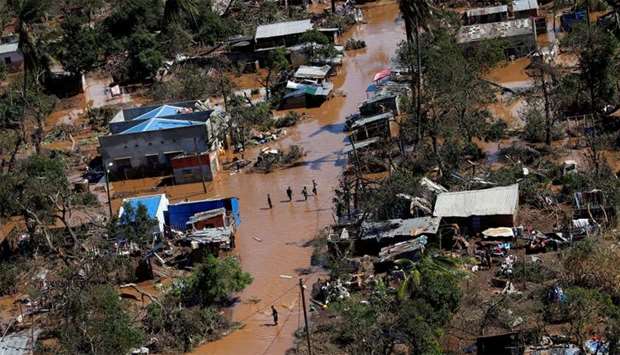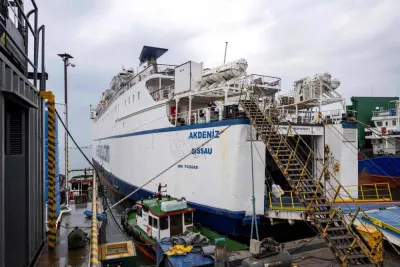* Helicopters plucking people to safety a week after cyclone
* Total death toll rises above 400, expected to go much higher
* UN says 200,000 Zimbabweans will need food aid for 3 months
* Rescue workers scouring more remote areas for survivors
Rescue workers plucked more survivors from trees and roofs to safety on Thursday, a week after a cyclone ripped through southern Africa and triggered devastating floods that have killed hundreds of people and displaced hundreds of thousands.
Helicopters whirred above the turbid, reddish-brown flood waters searching for people to ferry back to the port city of Beira, the main headquarters for the huge rescue operation in Mozambique.
The death toll in that country has risen to 217 and around 15,000 people, many of them very ill, still need to be rescued, Land and Environment Minister Celso Correia said.
But rescue workers continue to find bodies and the toll could rise sharply, he said.
‘Our biggest fight is against the clock,’ Correia told a news conference, adding that 3,000 people had been rescued so far.
In neighbouring Zimbabwe, the death toll from Cyclone Idai jumped to 139. The United Nations World Food Programme (WFP), which is coordinating food drops, said 200,000 Zimbabweans would need urgent food aid for three months. In Malawi 56 people were confirmed dead.
‘This is a human catastrophe of the highest order,’ businessman Graham Taylor told Reuters, saying he had seen ‘hundreds of bodies that had been washed up by the floodwater’ while trying to return home after visiting his son in Beira.
‘What struck me first was the number of people on the rooftops and in trees. You could hear communities shouting for help - for hours, for days,’ said Taylor, who also described meeting people on the badly damaged highways heading towards the devastated areas in search of family members.
‘It was a humbling experience,’ he said. ‘I saw no sign of government assistance.’
With some flood waters starting to recede, Environment Minister Correia said, the priority was to deliver food and other supplies to people in affected areas, although people were also still being rescued from the worst hit places.
Private TV station STV put the number of people still trapped in affected areas of Mozambique at 350,000 and said as many as 60,000 were believed stuck on roofs, trees and other higher places. The numbers could not be independently confirmed.
'PLEASE PRAY FOR US'
Idai lashed Beira with winds of up to 170 km per hour (105 miles per hour) a week ago, then moved inland to Zimbabwe and Malawi, flattening buildings and putting the lives of millions at risk.
The cyclone's torrential rains caused the Buzi River and the Pungue River, whose mouths are in the Beira area, to flood their banks. The scale of the flooding is huge - the UN satellite agency says floodwaters covered 2,165 square km (835 square miles) on March 20.
With more rain forecast for Beira on Thursday, Christian worshippers sang hymns on an empty tract of land where a pulpit was all that remained of their pentecostal church.
‘Here in Beira, all the churches have collapsed from this cyclone... Oh my dear brothers, please pray for us,’ said Pastor Luis Semente. ‘Only God can restore this.’
A key priority for Thursday was pushing into flooded areas that had not yet been surveyed, said Connor Hartnady, leader of a South African rescue task force.
Rescuers also want to move people from a basketball stadium near the Buzi River - one of the worst affected areas - to a village on higher ground, where aid organisations are setting up a temporary camp with a capacity of up to 600, he said.
The US military stands ready to help the cyclone rescue effort, a representative of the US Agency for International Development (USAID) said, according to the minutes of a humanitarian meeting held on Wednesday.
China, a major investor in Mozambique, also expressed its willingness to help, Portugal's Lusa news agency reported.
The WFP stepped up airdrops of high-energy biscuits and water purification tablets to isolated pockets of people stranded by the floodwaters.
The floods have brought the threat of waterborne and respiratory diseases, including pneumonia.
The Christian charity Tearfund said the timing of the floods was disastrous, with harvesting due to start in coming weeks. Even before the floods, 5.3 million people had been experiencing food shortages, said its Zimbabwe director, Earnest Maswera.
Mozambican President Filipe Nyusi, who declared three days of national mourning starting on Wednesday, has said the eventual death toll from the cyclone and ensuing floods could rise to more than 1,000.
Mozambique's tiny $13 billion economy is still recovering from a currency collapse and debt default.
The cyclone knocked out Mozambican electricity exports to South Africa, exacerbating power cuts that are straining businesses in Africa's most industrialised economy.



